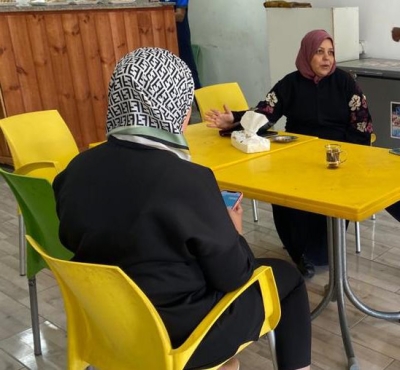

We are a couple from the cities of Jerusalem and Jenin. We established the "Monat Al-Beit " store, a family and collaborative project. The idea of the store simply began to take shape in 2018 when relatives from the family residing in Jerusalem would ask us to bring them some traditional foods from Jenin, such as sheep cheese, thyme, olives, honey, etc. These products were considered a priceless treasure and nourishment for the body and soul, as these products were scarce in Jerusalem and 48 areas in general.
Due to our travels and visits, the idea of the project initially started as an additional income for the household. However, as we delved into the details of traditional foods, the regions known for them, their production methods, history, and even their taste, our perspective on this project changed. It became a place where we could escape the pressures of our lives and responsibilities, despite the effort it required. It became a sanctuary for knowledge, storytelling, and getting to know people, cities, and villages. It turned into a passion that drove us towards establishing and developing this project into an online store as it stands now, and eventually into a physical store.
By the end of 2020, we launched " Monat Al-Beit" as an online store on social media platforms, where we began marketing five products under this name with simple packaging. We marketed electronically on Facebook and Instagram, receiving a wonderful reception from family, friends, and others who got to know us through our pages. From there, we started as a small store that grew over time to now offer around fifty distinctive products in terms of quality, taste, attractive packaging, and environmentally friendly and recyclable containers.
The uniqueness of our store lies in collaborating with several women, families, and farmers working on these traditional products (about 20 families). We search for the origin of the local product and provide it. For example, we provide sumac from the mountains of Meithalun village in Jenin, known for its sumac trees, olive oil from Salfit, which is known for the quality and purity of its oil, grape molasses from Hebron, a precious staple of its products, and traditional freekeh from the northern West Bank, as well as local olives and sheep cheese from the Northern Jordan Valley, along with other rich Palestinian traditional products that are countless. In addition to our personal production of sun-dried tomatoes and pickled cucumbers, which have garnered wide popularity.
The most important aspect is the authentic taste that takes you back to your ancestors' time. Despite the differences in tastes in all aspects of our lives, the majority of those who buy from us come together in their love for the taste and rely on its repetition, which boosts our morale and responsibility.
Our aspirations are simple but require a lot of effort. We aspire for our products to reach international markets, not just locally. We aim to enhance the production process so that the traditional products are made from organic vegetables from Palestinian farms. We aim to achieve even a small part of Palestinian self-sufficiency, encourage local production, provide job opportunities, and preserve the Palestinian culinary heritage for generations to come.
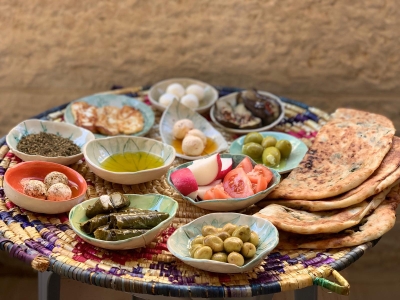
Sandy worked as a children's theater actress for 7 years, and she stopped working when she became pregnant with her son 4 years ago. Sandy's husband, George Ghareeb, is a lawyer who used to own a restaurant that relied on tourist income, but the COVID-19 pandemic led to the closure of the restaurant, and George couldn't reopen its doors again. With no job vacancies available during that period, Sandy decided to start a small project at home to generate income for her family. She learned soap making through online research, YouTube videos, and Facebook, and she also conducted research to find the best materials for soap making and the best suppliers for these materials. After purchasing the necessary materials, she started making and selling soap. Later on, she reached out to local entities and participated in their exhibitions. Sandy started her project two years ago and was able to develop it successfully to the extent that her project is now officially registered with the Ministry of Economy after her products were examined and approved. From Sandy's perspective, she sees the COVID-19 pandemic as a blessing in disguise in finding a project idea that brings stable income to her family while also fulfilling her passion. She always works on improving her soap making skills, as well as managing her small project and building strategic plans. Sandy participated in a training workshop organized by "Monshati" at the Chamber of Commerce. This training taught her proper marketing techniques for products on social media platforms. Additionally, she attended a workshop on product photography, where she learned professional product photography using various mobile applications, which in turn attracts customers' attention. Sandy expresses how her family has supported her project idea and its development from the beginning. Her husband helped her in developing the project idea, manufacturing the product, packaging, and scheduling customer orders. He also looked after their child while she participated in exhibitions to sell her project's products, being a supporter and an ally for Sandy as a woman. Currently, Sandy is in the market study phase, and her current plan is to sell soap with children's dolls in stores in large quantities. Sandy dreams of expanding her project from a room in her house to a small factory with employees, ensuring the continuous development of the project.
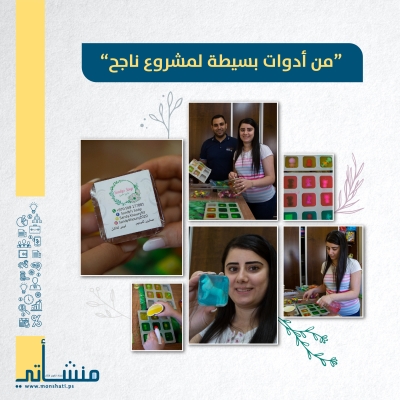
The proliferation of industrial products that negatively affect the skin and the high costs of treating skin problems led me to revisit Palestinian heritage (traditional olive oil soap and its benefits). This sparked the idea of creating an eco-friendly soap. In August 2021, I began reading about soap making. Around the same time, I came across an advertisement on Facebook for a soap making workshop at Khadouri University branch in Ramallah - Continuing Education. After completing the workshop, I started applying what I learned while continuing to read scientific materials from books and research on soap. I distributed my products to acquaintances and friends, collecting feedback from them, and continued this for 5 months. Then, I started with a capital of 500 shekels and relied entirely on manual work, which I still do to this day. Initially, products were bought by acquaintances, and then I started participating in exhibitions, the most important of which was the Harajeh Market with the Ramallah Municipality. The costs of participation and transportation were high, as the Harajeh Market ends at 9 or 10 in the evening. However, no project is without obstacles and challenges, especially at the beginning, but determination and commitment were able to overcome all of that. Currently, I produce olive oil soap with herbal extracts and oils that give it an advantage over other soaps, as it is free from fragrances and preservatives and suitable for all skin types (moisturizing, lightening, delaying signs of aging). In late January 2023, I saw an advertisement on Facebook from Monshati regarding holding training courses on project management. I enrolled in several courses such as project management, digital marketing, crisis management, problem-solving, and entrepreneurship. This increased my knowledge about my project comprehensively and systematically, with a sustainable perspective towards growth and development within an organized framework and utilizing available resources despite the small capital.
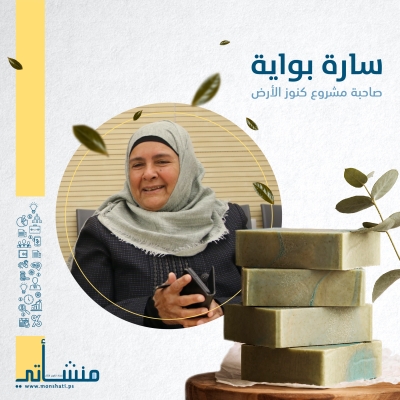
My project "Farfalla" means "butterfly" in Italian. I chose the Italian language because Italy hosts the first and largest butterfly exhibition, with approximately 60% of rare butterfly species. The project specializes in employing butterflies after they have been preserved in artworks. My name is Ghadeer Abu Mashal, 26 years old and from Gaza. I graduated with honors in Accounting and Finance, but I didn't have a passion for numbers. I loved nature, and whenever I saw people drawing, I wished to be like them, but unfortunately, I was bad at drawing since childhood. However, this time I found my passion and decided to learn drawing. I took courses between my university lectures and learned. It left a mark in the field of arts, like accounting and more. Butterflies had a significant share in my drawings, and every time I saw a butterfly, I loved to observe it and felt great affection when it landed on my hand or shoulder. After finishing university, I decided to learn more about the world of butterflies. I studied everything about them, and the more I read, the more I admired the field, marveling at the Creator's work. The idea of the project never crossed my mind until one day, while scrolling through Instagram, I stumbled upon a video of someone preserving spiders. It struck me that butterflies have a short lifespan, and after completing their natural life cycle, they mostly retain their beauty. So, why not preserve their beauty? That's how my project started, and I will continue until I build a butterfly garden and raise them while preserving their beauty. I faced difficulty in obtaining certain types of butterflies, especially those not known locally, but I managed to overcome this stage. Currently, I'm struggling with marketing the project, and all my sales so far have been to friends and acquaintances. I don't know where to start with marketing and how. I hope Monshati's training courses will help me more by guiding me to market and achieve the remaining goals of the project.
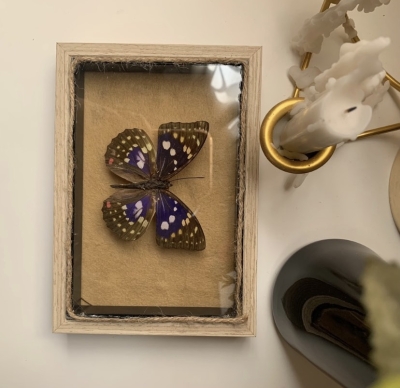
My project, Tastemade Healthy, carries the message of "A healthy life without deprivation." Our idea stemmed from the concept that one can enjoy sweets without causing a spike in blood sugar levels or harming the body, while still maintaining a great taste and flavor. On the other hand, we aimed to change the stereotypical image of healthy desserts. Most people associate them with unpleasant taste, but we challenged this perception by creating products from high-quality raw materials that are beneficial for the body, skin, and hair, such as coconut oil, natural olive oil, almond flour, coconut flour, oat flour, and natural sweeteners like dates, honey, erythritol, and molasses. Our vision is to pioneer in preparing healthy desserts to reach a disease-free community. After training with Monshati, I became capable of developing a structured plan from all aspects, including market research, marketing and promotional plans to ensure the continuity and development of the project. Additionally, I gained the ability to expand marketing for healthy products in other provinces.
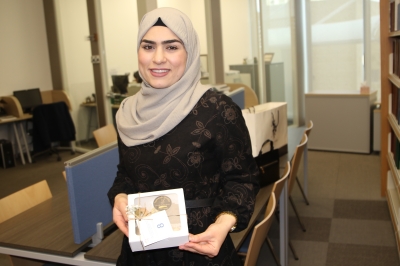
Learning STEAM (Science, Technology, Engineering, Art, and Mathematics) has become more important than ever before, especially in early childhood. It has become the orientation of jobs and careers now and in the future. Therefore, in Kids Lab we focus on creating fun experiences for children and challenges that arouse their curiosity in the fields of science, technology, engineering, and mathematics and help them acquire the skills of creative thinking, cooperation, perseverance, and curiosity.
At KidsLab, we believe that Every child can invent, so we help children move away from traditional thinking, provide the right resources and atmosphere for them to arouse their curiosity, and encourage them to explore. All the activities and challenges that we present to the children are being applied using scientific and engineering thinking and design thinking, we strive to make it a way of life for our children. We start each event by arousing their curiosity by preparing the right atmosphere or raising many questions, urging the kids to think about solutions to the problem, discuss solutions with their colleagues to reach the best choices, try and implement the solution, evaluate, and improve. We prepare children for life and the future through science and engineering. Exercises include a different hands-on activity in each class, some activities are given by games and scientific models specifically for each subject, and most of the activities rely on recycling in their application to promote this important culture in the minds of our children.
I’m the manager of a local project that provides STEAM training for kids. During the Covid-19 quarantine, we were forced to close our location, and it was difficult financially to keep the project closed, and very difficult emotionally for us as a team to stay with no work. With the trend of online education especially using zoom and hearing all the families struggling with their kids who are spending a lot of time on the screens, we came up with the idea of preparing boxes that contains a set of STEAM experiments materials, tools, and catalog for each experience for the families as a gift for Ramadan. We prepared only 50 boxes that surprisingly sold in a few days!
After that, we prepared more 2 boxes with different collections of experiments, and what was strange was that most of the first box’s customers bought the second and the third box, and from there we upgraded the idea to become subscription boxes to get a new box either monthly or quarterly. And based on the needs of our customers we started to provide zoom classes for each box.
In the past, the toys and robots we had were enough for only nine children, and our goal was to reach fifteen children, after taking Monshati services, we were able to increase the number of robots, toys, and equipment to reach our goal.
My dream for the children's lab is to be the first officially registered laboratory in Palestine.
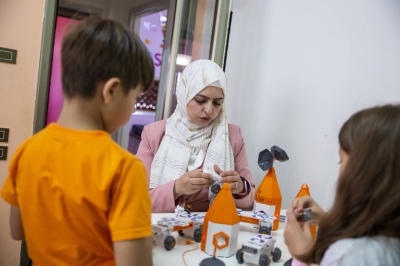
Manoly wood company was founded in 1970 by the first generation and is a family business.
Rashad says, "I've always been thinking about how to develop a family business and how to separate family and management in the same company, it's a big challenge."
During my time I heard from the Chamber of Commerce about the governance training program, I attended the program because I wanted to apply it to our companies, for the benefit of the second and third generations, my generation, my son's, and my daughters' generations.
After training, I was able to come up with a structured plan for our company's development and sustainability. Now I have already appointed an external financial adviser to build a system for family members involved in the company and employees at the same level as the first step to manage the construction of the company's structure.
We didn't have a recruitment strategy for employees, especially for family members, and we used to solve these problems at home now that after the governance program, we have a clear structure that also applies to family members and we started to hold a formal management meeting regularly which made our way of life organized and more professional.
In the past, we were unregulated internally and now we are much better.
I would like to continue to get consultations through Monshati, to run our business and take it to a different level.
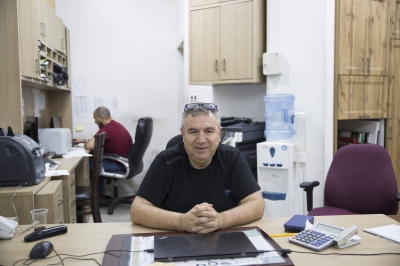
Ein Sultan camp
Business: Mahmoud Wishah Pastry Chef
Mahmoud’s passion for pastries started when he worked at a coffee shop in Jericho, which led him to take some courses locally and then went to France, through the French cultural center, to learn in a professional culinary school.
In 2020, during the Covid-19 pandemic, Mahmoud decided to leave the coffee shop and start his own business. He started by making sweets at home and posting photos on his Facebook page. He specializes in western sweets and cake. Gradually, people started to recognize his work.
Mahmoud said “My specialty is that I managed to join the marketing and food safety training with the Monshati program and it was very helpful and I gained importantly
knowledge to take my business to a different level.”
The marketing workshop taught Mahmoud the best ways to post on social media, how to communicate with clients, and to have more reach through digital marketing.
To Mahmoud, the food safety workshop was very important since his work requires him to mix different foods, and understanding the concept of food poisoning and how to avoid it is essential.
Mahmoud added, “I'm looking forward to advanced training on the same topics in the future.”
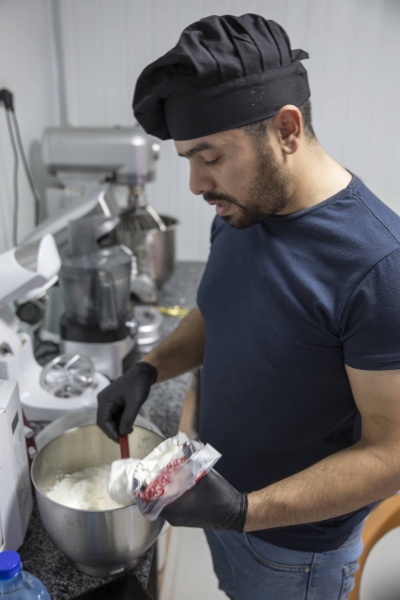
Samer has been working with wood for the past 6 years. He collects unwanted used wood from different places, including Jericho's streets, construction sites, and old furniture. Since the municipality doesn’t have the ability to collect big objects like thrown furniture, Samer takes this responsibility by cleaning his neighborhood and at the same time benefits by recycling these remains and selling them. Especially since the quality of old wood is better than the new one.
Through the chamber of commerce, Samer received equipment for his small carpentry shop, such as an electric circular wood saw for cutting the wood, a Jigsaw, an air compressor, and a sander.
Samer said “In the past, I used to use manual equipment, it was very slow and unsafe and I injured myself many times. Today I’m using the new and safe equipment.”
With the new equipment, Samer can manufacture a piece in 2 days instead of 10. The remaining challenge is the transportation of these big objects from the streets to his carpentry at home. Samer added “I hope in the future I can manage to get a small trolley
to move the objects .”
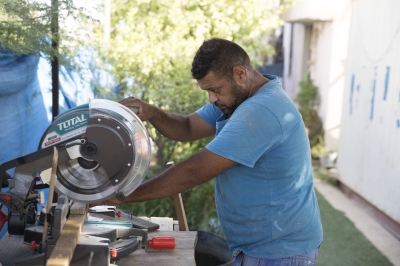
Nermine Abu Daqqa, a twenty-two-year-old girl, did not hesitate to enroll in Monshati-based training to develop her skills and specialization in ceramics and sculpture. Her project "Impact and Impress" had the opportunity to receive training from Monshati, which taught her to appreciate the fine art more deeply and added new fine art outputs to the project. Nermine described the training, saying, We are the ones who control our lives, either by choosing to make it ordinary or simply turning it into art. I mean, at first, the piece of pottery was just clay, and in the end, it became a work of art. Thank you, Monshati.
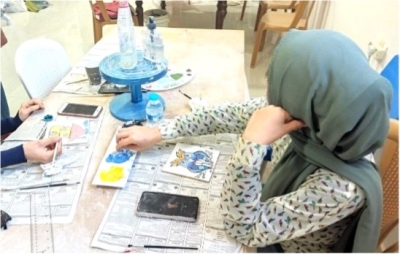
The Covid-19 pandemic has created enormous challenges that have affected many women and girls in Palestine. However, they fought fearlessly for their families and communities, and " Monshati" was their main supporter. Mrs. Hanan Amash, owner of a pastry shop in Uqbat Jabr camp in Jericho, was the first beneficiary of the services of Monshati Helpdesk, where she received advisory services for accounting, and photography of her products through mobile, and a direct specialized course for making sweets, also her son has benefited from the services, who helps her in the pastry shop, which helped to increase her production and sales, and Introducing a new production line, where she bought a machine to make hummus and a large frying pan for falafel and used her courtyard to sell it.
